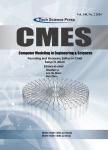On Ductile Damage Modelling of Heterogeneous Material Using Second-Order Homogenization Approach
作者机构:Faculty of Mechanical Engineering and Naval ArchitectureUniversity of ZagrebZagreb10000Croatia
出 版 物:《Computer Modeling in Engineering & Sciences》 (工程与科学中的计算机建模(英文))
年 卷 期:2021年第126卷第3期
页 面:915-934页
核心收录:
学科分类:08[工学] 0802[工学-机械工程] 080201[工学-机械制造及其自动化]
主 题:Ductile damage second-order homogenization multiscale approach C1 finite element
摘 要:The paper deals with the numerical modelling of ductile damage responses in heterogeneous materials using the classical second-order homogenization *** scale transition methodology in the multiscale framework is *** structure at the macrolevel is discretized by the triangular C^(1) finite elements obeying nonlocal continuum theory,while the discretization of microstructural volume element at the microscale is conducted by means of the mixed type quadrilateral finite element with the nonlocal equivalent plastic strain as an additional nodal *** ductile damage evolution at the microlevel is modelled by using the gradient enhanced *** macrolevel softening is governed by two criterions expressed by the increase in homogenized damage variable and the threshold of the local equivalent *** softening at each material point at the macrolevel is detected by the critical value of the homogenized damage,where homogenization of the damage variable is performed onlywithin softening *** to the nonlocal continuumtheory applied,a realistic softening behaviour is demonstrated after the damage initiation,compared to the widely used first-order homogenization *** algorithms derived have been embedded into the finite element code ABAQUS by means of the user subroutines and verified on the standard benchmark *** damage evolution at both microlevel and macrolevel has been demonstrated.



